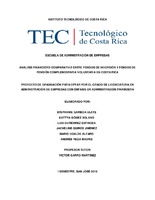Análisis financiero comparativo entre fondos de inversión y fondos de pensión complementaria voluntaria en Costa Rica
Fecha
2019Autor
Gamboa-Ulate, Stephanie
Gómez-Solano, Kattya
Gutiérrez-Espinoza, Luis
Quirós-Jiménez, Jackeline
Ugalde-Alfaro, Mario
Vega-Madriz, Andrés
Metadatos
Mostrar el registro completo del ítemResumen
Durante los últimos años, el sistema de pensiones en Costa Rica ha venido en declive, al punto que se ha vuelto inestable y ha generado desconfianza en los contribuyentes. A pesar de esta situación existe una opción financiera para realizar un ahorro a largo plazo, la cual sería los fondos de inversión. Estos poseen condiciones únicas que se ajustan a diversos perfiles del inversionista. Es por esta razón que surge la siguiente pregunta de investigación ¿Es un fondo de inversión mejor que un fondo de pensión complementaria voluntaria en Costa Rica, tomando en consideración las variables de rentabilidad, plazo, riesgo y costos? Para dar una solución a la anterior pregunta se efectuó un análisis financiero comparativo entre los fondos de inversión y fondos de pensión complementaria voluntaria en Costa Rica.
El presente trabajo se desarrolló bajo una metodología de enfoque mixto, ya que en él se incluyen variables cualitativas (riesgo, plazo y costo) y una variable cuantitativa (rendimiento) que se analizó a través de la media, desviación estándar y coeficiente de variación, esto por medio de un estudio exploratorio de la unidad de análisis la cual corresponde al fondo de inversión, tanto de ingreso como crecimiento, así como, el fondo de pensión complementario voluntario vigente en Costa Rica para junio, 2019. Se determina que, en términos generales, los fondos de inversión presentan un mayor rendimiento en comparación con los fondos de pensión complementaria voluntaria. Siendo los fondos de inversión abiertos en colones los que poseen un mayor rendimiento a través de los últimos 10 años, sin embargo, el rendimiento de los fondos de pensión se ha mantenido estable en el mismo lapso. Finalmente, se recomienda al cliente financiero invertir en fondos de inversión y que esté constantemente monitoreando los cambios que puedan afectar el rendimiento y demás variables financieras. During the last years, the pension system in Costa Rica has been in decline. It has reached to the point that it has become unstable and has generated distrust in the contributors. In despite of this situation, there is another financial option to make long-term savings, which are the investment funds. They have unique conditions that fit in with different investor profiles. For this reason, the following research question arises: Is an investment fund better than a complementary-voluntary pension fund in Costa Rica, taking into consideration the variables of yield, term, risk and costs?
To provide a solution to the previous question, a comparative financial analysis was carried out between the investment funds and complementary-voluntary pension funds in Costa Rica.
This investigation was developed under a mixed approach methodology, since it includes qualitative variables (risk, term and cost) and a quantitative variable (yield) that were analyzed using the KPI’s of average, standard deviation and coefficient of variation, This was done through an exploratory study of the unit of analysis which corresponds to both the investment fund (income and growth) and the voluntary-complementary pension fund active in Costa Rica for June, 2019.
It has been determined that, in general terms, investment funds show a higher yield in comparison with the voluntary-complementary pension funds. Being the opened investment funds in colones the ones that have the highest yield over the last 10 years. Nevertheless, the yield of the pension funds has remained stable in the same period.
By last, is highly recommended to the financial customer to use the investment funds as an option for long-term saving and to be constantly monitoring changes that may affect the yield and other financial variables.
Descripción
Proyecto de graduación (Licenciatura en Finanzas) Instituto Tecnológico de Costa Rica, Escuela de Administración de Empresas, 2019.


